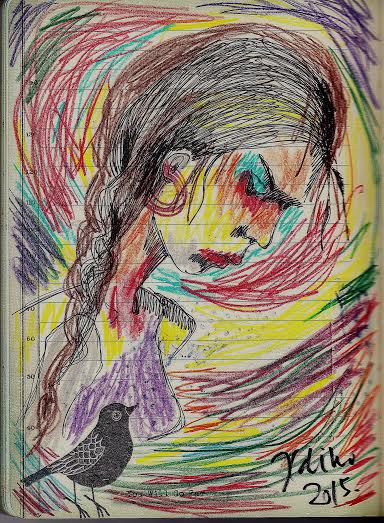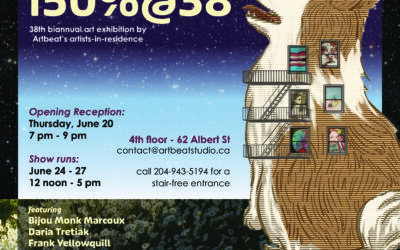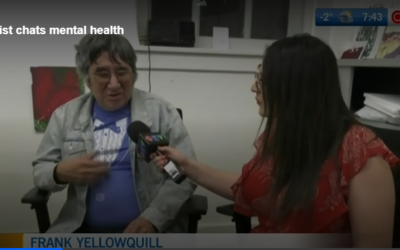ASLI MAGAZINEÂ Â | Â
ASLI Artist Ildiko Nova speaks to us about her thoughts on mental illness and art, saying “My art is my sanctuary where I don’t have to fulfill any social norms or expectations from society.â€

‘Storm’ by Ildiko Nova.
Ildiko Nova, 49, from Winnipeg, Manitoba, Canada is an existing ASLI Artist who we featured in our first issue “Celebration of Women†please follow this link to read the article “Romani Artist Ildiko Nova Uses Visual Art to Discuss Under Represented Communitiesâ€
In issue 2 “Mental Illness, Health and Recovery†we speak to Ildiko about her latest submission and her own mental health and how her art influences her own mental well-being and what views she holds on mental illness and art.
Here is our interview with Ildiko Nova:
What motivated you to deal with your chosen submission subject?
The picture represents a girl who is frustrated, angry and desperate. I did this piece as awareness of how some minorities are left out; do not have a chance to get proper education and fair participation in communities. They are not valued by the mainstream society and often blamed and scapegoated for further social problems. All of these factors lead to devastation in a person’s life.
What is your process when creating?
My art is mostly idea-oriented. I like to do fast sketches and sometimes they develop into a bigger, more detailed piece or painting. I love to take long walks in the city to observe the surroundings.
Who are you influenced by within your artistic discipline?
I am mostly influenced by other artists in the community. I facilitate a lot of workshops and I am amazed how one idea develops differently with each participant.
About mental health:
Can you tell us about your own experiences with mental illness?
I’ve been a very troubled child; my birth parents abandoned me and my siblings at a very early age. We’ve been raised separately. Â I am still learning about how my life has been affected by early trauma.
How does your artistic /creative expression help you with your mental health?
My art is my sanctuary where I don’t have to fulfill any social norms or expectations of society. Â I enjoy the freedom of creation where ideas can flow spontaneously.
Have you ever experienced being stigmatised or marginalised due to your mental health or have you seen this happen to someone else?
I’ve been excluded due to my racial background throughout my school years. Children of my generation had not been taught to accept anything or anybody “differentâ€.  I tried to fit in and it did not work. I’ve been frustrated and angry.
Have you ever received treatment for mental health and if so, what was it, did it help and was it private or state funded?
I’ve been in a program of suicide prevention in Toronto in 2010, referred by my family physician. My caseworker (outsourced by the psychiatrist who was useless) was a good listener. Right now I am seeing a private psychiatrist. He is very helpful.
Do you think society and culture is accepting of people with mental illness?
No, society does not accept people with mental illnesses. One part is the lack of compassion; the other is lack of knowledge. Often, people do not even know how to talk to a person who appears to be vulnerable or troubled. The bigger the community (or city) the more of a “not-my-problem†attitude exists.
How do you feel your Government in your country helps people with mental illness and could they do more?
The government is not helping enough. It is actually shameful how a resourceful, rich country such as Canada does not solve basic housing issues to this population. Mental illness is often hand in hand with homelessness.  Socio-economic conditions and injustice break mental wellness – obviously. Mental wellbeing not going to happen until the mass has to compromise their entire time to fulfill minimum wage jobs to provide a humiliating, basic core survival level .
Have you ever had any creative therapies as part of your treatment, did it help?
I’ve finished a six-month residency art program at Art Beat Studio in Winnipeg. This organization provides (free of charge), safe studio environment for people who struggle with mental health and related social problems. I felt that it gave me a chance to re-connect to communities, to grow as an artist and to heal.
Do you think artistic / creative expression can be used to help people with mental health problems?
Absolutely! Once a person opens up her/his creative side it leads to self-encouragement and improved self-esteem.
Do you think artistic / creative expression could help raise awareness and communicate how mental illness affects people?
Yes, artistic expression should be a “bridge†between the mentally ill and those who are not. Every artwork is somebody’s personal story and once it is told, more people can relate or open up to perspectives.
What made you want to get involved with ASLI’s MENTAL ILLNESS, HEALTH AND RECOVERY CAMPAIGN?
I want to be involved with the Mental Illness, Health and Recovery Campaign because I feel that more awareness and public education is needed. Many people do not realize that mental health is fragile and can affect anybody, even those who see themselves as successful and un-related.
Do you believe in more rights for mentally ill people in the workplace and for equal opportunities?
Yes, people with mental illness should be included in a healthy society. Everybody can be helpful to each other. Â Social inclusion can improve the life of a mentally ill person. I know a lot of people who are diagnosed with mental illness yet highly functioning and are active in the city.
We at ASLI want to de-stigmatize diagnosis labels within mental illness so that people treat others and their own mental health label as that of a diabetic or any other chronic “physical†illness, as we know the brain is physical and this would further improve stigma and marginalising mental illness. How do you feel about diagnosis labels?
I don’t believe in labelling. Andrew Feldmar and Gabor Mate said that the only mental illness is (childhood or any) trauma, therefore PTSD. Â The labels lead to prescriptions. Once a person gets some medication it gives the illusion that care is provided. The real help would be a society where people actually have quality lives. It is not going to happen until the mass has to compromise their entire time to fulfill minimum wage jobs on a humiliating, basic core survival level. Socio-economic conditions and injustice break mental wellness.
Everyone within ASLI is affected in some way by mental illness, with our MD having several chronic mental illnesses and other members either caring for or dealing with mental health issues. Would this make you think twice about working with ASLI? And does this make ASLI “less professional†in your opinion and if so why?
No, not at all. I think the work of ASLI is great. People who are affected by mental illness are NOT less professional than anybody else. My current work environment with Art Beat Studio is similar. I appreciate that people in this field are so open-minded, sensitive and highly empathetic.
Are there any artists/creatives/performers which you admire, who suffer from mental illness that you feel use their work to discuss or highlight mental health?
Most of the great artists are affected by mental illnesses and creative mind means (spiritual) freedom.
Finally is there anything else you would like to tell us about yourself or your experiences?
I would like to thank to Art Saves Lives International to their dedicated efforts, hard work and thanks for selecting my work. It is a great privilege to bring my work to this organization. I wish everybody the best for the future.
We love our artists at ASLI Â as if they were family, we offer our existing artists a chance to be apart of each quarterly campaign. When you have been featured in the ASLI magazine or exhibited with us at one of our pop up exhibitions you are automatically given the title as one of our ASLI ARTISTS. We hope to eventually have a multitude of artists from all differing disciplines and from all over the world, so we can, as a movement, create change and save lives through art. Ildiko Nova is part of this movement and we thank her from the bottom of our hearts.[hr]
Republished from http://artsaveslivesintmagazine.com/ [hr]




